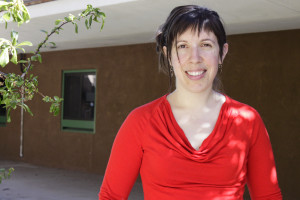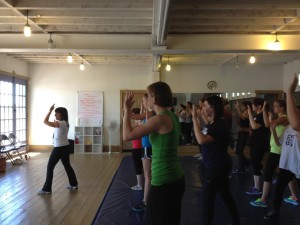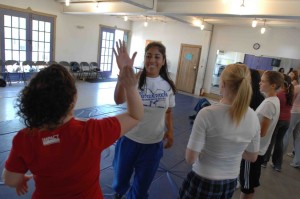Tags
Related Posts
Share This
IMPACT Personal Safety
America is a country where an unarmed person of color can be gunned down, a transgender individual can be assaulted and arrested for using their preferred restroom and one out of every three women experience physical or sexual violence from a man in their lifetime. IMPACT Personal Safety is a nonprofit violence prevention program stationed in New Mexico that offers classes in deterrence of physical and emotional abuse, self-defense and healing. It serves between 4,000 and 6,000 people in the Santa Fe area every year. Jackalope Magazine spoke with Alena Schaim, executive director and instructor at IMPACT.

Alena Schaim is the executive director and an instructor for IMPACT Personal Safety. Photo by Amaya Hoke
Jackalope Magazine: How would you describe the mission of IMPACT?
Alena Schaim: We talk about it as a spectrum of violence prevention, which means that everything promotes ‘primary prevention’ so that hopefully perpetrators aren’t created in the first place. [We have classes on] anti-bias, anti-bullying, working with staff and families to exploring healthy boundaries and healthy relationships to finally, ‘what can I do when I find myself in a moment of inevitable violence?’ What many people call ‘self-defense.’
JM: Do you think IMPACT can be beneficial to students, such as those at Santa Fe University of Art and Design?
AS: What I know is that the threat of violence affects all of our lives in different ways. For some people, that means the threat and fear of violence [from the past] are still affecting us, and for other people it’s being perceived as a threat, and for some people it’s both. We’re all constantly making changes to our lives because of that fear in society. Being proactive about it is a fantastic thing.
JM: Has there been any influence on the program by recent events in America’s social justice system?
AS: I think that one of the ways IMPACT continues to grow is informed always by the culture around us. That includes the fact that many trans women of color have been incarcerated for self-defense. That includes the fact that many people, trans women of color, men of color, are seen as threatening just by their very existence, which means that, unfortunately, when using self-defense, some people have to work harder than others to establish that it was not initiated aggression. That means we have a lot of work to do when it comes to primary prevention and working on racism and transphobia and all the other issues around oppression that create violence.
JM: What kind of programs does IMPACT have for young children?

IMPACT offers courses in self-defense among others. Photo courtesy of IMPACT Personal Safety
AS: With any of our classes, we emphasize situations with people we know, rather than strangers, since that’s what happens more often. It’s not so much awareness as it is skills to navigate situations. In our children’s classes, a lot of that is around what we as adults would describe as grooming practices, where someone that the child knows tries to eventually push their boundaries in a way that the child will feel… ashamed to tell anyone about. We’re working on protective factors around that. We also have a class called Change the Course as our anti-bias and anti-bullying curriculum. We went from just doing it in middle school to doing it in elementary school because we know how early those issues start.
JM: What are IMPACT’s volunteer or career opportunities?
AS: We have opportunities to volunteer and to intern. Internships can vary. We try to balance our administrative needs with professional development for whoever is interning with us. That can be things like outreach [or] being involved in our programs and being a part of our staff meetings to debrief them and to prepare for them. For anyone who wants to go into the nonprofit sector, going to collaborative meetings to understand technical and funding opportunities.
JM: What is the cost of the courses offered by IMPACT?
AS: We try to keep the classes grant funded. We got our first VOCA grant, which is the Victims of Crime Act, which makes it so that anyone that has been a victim of crime can take a self-defense class with us at no cost. [A victim of crime] is defined pretty broadly so that includes not just sexual or domestic violence but things like burglary or DUIs, and it doesn’t have to have been reported to law enforcement. We know that the vast majority of [victims] don’t report to law enforcement. As far as our collaborative classes, those tend to be grant funded or places like private schools [donate to us]. We’re good about finding ways to fund or to start at lower cost. We receive a number of private donations as well as business donations.
JM: What is your favorite aspect of IMPACT?
AS: What IMPACT is most known for is the role-play scenarios. I really like teaching in those scenarios and helping students get to the point where they can overcome their fear or rage when they’re speaking up about violence or bias and finding the words that actually affect change in their lives and in the community. To see a student’s excitement and feeling of empowerment is pretty great.

IMPACT focuses on primary prevention. Photo courtesy IMPACT Personal Safety
JM: Do you have any final words for the younger generations?
AS: One thing I always say is that young people know about injustice, and care about injustice inherently. Starting from a very young age, we know when things don’t feel fair, whether it’s affecting us or someone else. IMPACT gives people the tools to be able to change those things in their lives and their community, so I think IMPACT is a very natural fit to what young people already care about.
Visit IMPACT’s website to find out more about upcoming classes and volunteer or internship opportunities.






 Jackalope Magazine is the student magazine of Santa Fe University of Art and Design. Building on the interdisciplinary nature of our education, we aim to showcase the talent of our university and character of our city.
Jackalope Magazine is the student magazine of Santa Fe University of Art and Design. Building on the interdisciplinary nature of our education, we aim to showcase the talent of our university and character of our city.
Recent Comments